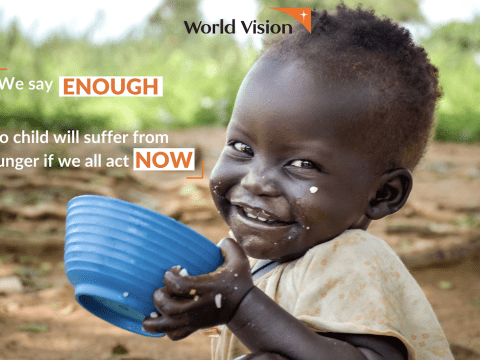Harnessing policy and governance to tackle Africa’s hunger crisis

Opinion piece
Hunger is a greater threat to children than ever before. As climate change and conflict threaten food security, the youngest members of society are struggling to eat.
The physical effects of hunger are severe. Around the world, 45 million children under the age of five experienced wasting in 2022. 148 million experienced stunting, almost a third of whom (44.4 million) live in Africa.
Our continent is rich in land and natural resources. Yet it’s the epicentre of a global hunger crisis. A fifth of the African population is undernourished. More than a billion people are unable to afford a healthy diet. In Sudan, where 18 million people are acutely hungry, a meal may consist of grass, peanut shells or even chameleons.
The crisis is escalating rapidly. Acute hunger has grown by more than 120% on the continent in the last 8 years. And it impacts every part of children’s lives. Children may work to put food on the table instead of going to school. Girls may be forced into early marriage if their parents can’t afford to feed them.
At World Vision, we say ENOUGH is ENOUGH.
We know we can have a major impact in Africa. It’s home to eight of the top 10 World Vision Partnership Offices. In February, we committed to spend $1.7 billion over three years to support its population. Our efforts will reach 54 million children across 27 countries.
We provide food and cash to families and run numerous initiatives like school meals programmes and essential nutrient services. But this alone isn’t enough to meet the extraordinary challenges facing the continent. We need to challenge systemic weaknesses in the policies of our governments. We need to lobby for the infrastructure that will enable us to deliver aid where it’s needed. We need to galvanise political will to end child hunger for good.
World Vision leaders in Africa convened on 24-25 July at the Africa Regional Forum to learn from one another, renew our commitment to growth and help design new and powerful humanitarian programmes. Each National Board has its own goals and strategies. But we are all bound together by shared Christian values and a common mission: to follow in our Lord’s footsteps and empower the poor, the vulnerable and the oppressed.
Crucially, our influential Board Members have extensive networks beyond World Vision. They can champion this cause and help us collaborate with new partners and organisations. They can be advocates for funding for humanitarian services like food and cash assistance.
We need to explore every avenue and leverage every resource to sustain our life-saving work and to expand our footprint. To reach more hungry children. Together, our Boards and Advisory Councils can ensure we meet the growing needs of our communities.
Responsible leadership is key to making meaningful and lasting change for our communities. We subscribe to the United Nations’ principles of ideal governance, which means elevating the voices of the vulnerable. Children’s concerns must be heard in all elements of our decision-making. Children like Gaby and Thomas.
“Hunger and malnutrition exist in my country. It manifests itself in term of illness in children: Marasmus and kwashiorkor,” says Gaby, 16, from Burundi. “As consequences, many children are stunted. At school, those same children have low results in school. They also face stigma from other children because they look sickly. Many children drop-out of school.”
Thomas told us: "Children are sometimes forced to be married off at a young age to help support their families financially due to a lack of food and other livelihood resources at home. At the end of the day, this can have devastating consequences on the child’s education, health, and overall well-being."
We know there is ENOUGH nutritious food in the world for everyone. But we need more than just two loaves and four fish to feed the ‘thousands.’ Just like Jesus, we need to move hearts. This requires ENOUGH influence. ENOUGH impact. ENOUGH income. ENOUGH favour. And most importantly, ENOUGH FAITH.
With our ENOUGH campaign, we want to ensure there is ENOUGH money from governments, sponsors and partners and ENOUGH political will to get food where it is needed. To make sure children have ENOUGH to develop a health body and mind.
We know there are many other blockers to the delivery of humanitarian aid. Vulnerable infrastructure can slow down our ability to respond in remote locations—a challenge that will worsen with climate change. When heavy rain batters DR Congo, it can turn roads into impassible mud tracks. We advocate for better road maintenance from government, NGOs and local communities. We champion changes that will make each day easier for our humanitarian teams and ensure aid can be delivered long into the future.
Climate change impacts food security across the continent, from flooding in Sudan to drought in West Africa. In Ghana, we teach climate smart agricultural practices to help households grow more resilient crops as rainfall becomes heavier and dry spells become longer.
We believe there is enough political will across Africa to bring child hunger to an end. But we need to act now to turn that will into concrete action. So that every child can survive and thrive.
As our President and CEO Andrew Morley says, “When we talk about enough it's not just about food, it's about giving children the life that God has called them to have.”
Article by
Lilian Dodzo - Regional Leader East Africa
Mark Kelly - Regional Leader Southern Africa
Carla Denizard – Regional Leader West Africa